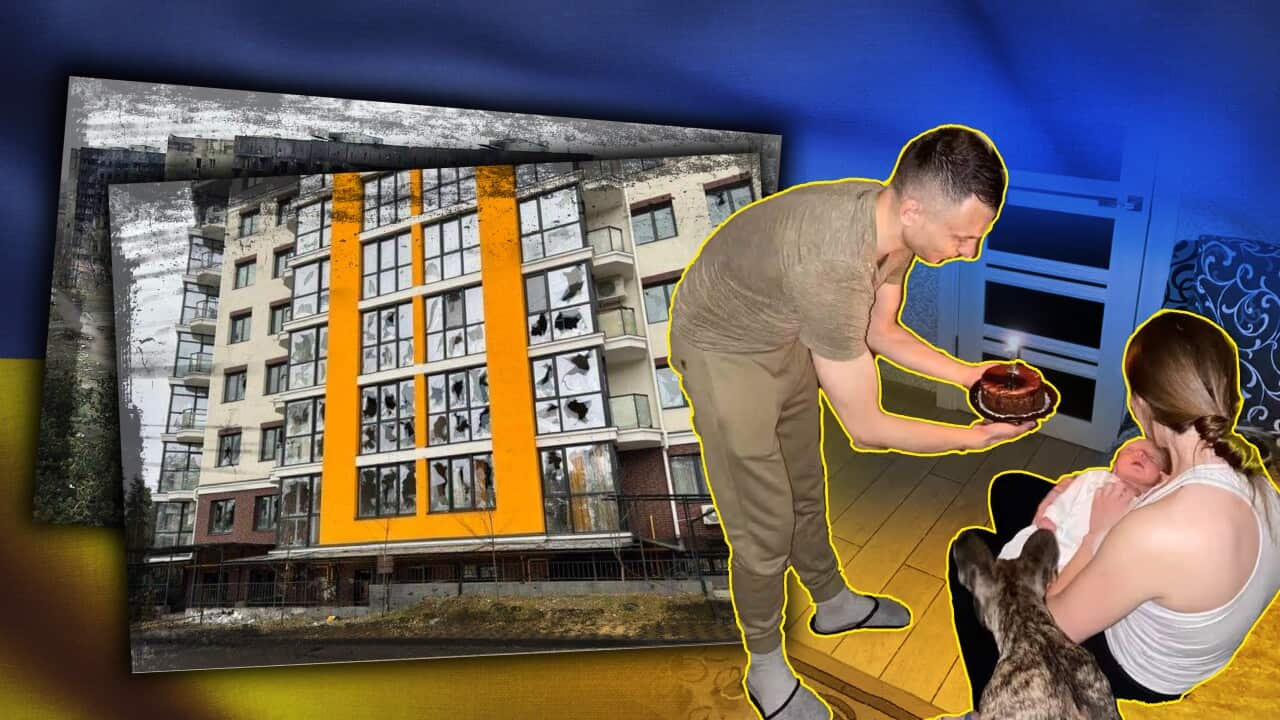Key Points
- It's now been one year since Russia launched it's invasion of Ukraine.
- Accounts of that first year have been captured in the podcast series 'Voices from Ukraine'.
- Among the stories are those of four Ukrainians from different parts of the wartorn country.
One year has passed since Russia commenced its invasion of Ukraine, and the numbers of those touched by the conflict are staggering.
At least 8,000 non-combatants have been confirmed killed with nearly 13,300 injured, , although the true number is likely to be substantially higher.
More than 8 million refugees who fled Ukraine have been recorded across Europe, while a further 8 million have been displaced within the country.
Numbers that may be impossible to capture are the individual stories of devastation - civilians who have survived the bombings, and the loss of their dearest possessions while facing constant fears for their loved ones who joined Ukraine's armed forces.
These accounts, captured via text and audio messages as part of the SBS Russian podcast series , offer a glimpse of the horrors faced by non-combatants over the past year.
'Mum, I'm still alive'
When SBS Russian last spoke with Dr Ekaterina Melnik - a paediatrician from Kyiv – the war was only days old and fighting had reached the outskirts of Ukraine's capital city.
No one was prepared for the war in the children's hospital where Dr Melnik had worked for many years.
"There were about 15 air raid alerts, and every time we had to take our patients into the basement. Explosions are heard all the time, we can hear shooting all the time," Dr Melnik said on the fourth day of the conflict.

Ekaterina Melnik, pediatrician at the Kyiv City Children's Clinical Hospital No. 2. Credit: Photo by Ekaterina Melnik
"We also have a neonatal intensive care unit here, and now there are eight babies on ventilators.
“We can't even move them to the basement, they are staying on the first floor and someone needs to be with them all the time.”
At the time, Dr Melnik addressed Russian citizens, explaining that she held a Russian passport, her mother was from Russia, and that she lived happily in Ukraine and "didn't ask anyone to save her".
"It's simply heartbreaking when my 15-year-old son opens his eyes in the morning and says, 'mum, I'm still alive'," Dr Melnik said.
One year on, Dr Melnik said the current situation in Kyiv is "not as scary”, though the threat of Russian airstrikes is a constant strain.
"We can hear explosions from time to time, and we live in anticipation of these strikes and don’t know where the rocket will hit next."
She said her family tried to send her youngest son to a safer place but he refused and they have remained together in the city.
"When you can see your loved ones every day, when we are all together, you feel better.
“We didn't leave then, during the most difficult period, and we are not going to leave now.
"Ukraine is a tiny country compared to huge Russia with its resources and a large population that no one spares. We simply can't cope alone, we need the help of other countries. And I want to thank Australia for all your help."
'I turned into a stone'
When SBS Russian spoke to Tatyana - an employee of the Opera Theatre in Odessa – the war was in its 44th day.
"The first days of war were really scary," she said.
"But then all the emotions vanished and I felt nothing. I turned into a stone. You just remind yourself that you need to live to help those who need it more."
During this time, she decided to volunteer by delivering food and medicine to the elderly and sick people in the city.
Her eight-year-old daughter stayed with her, while her 19-year-old son was drafted to fight.
"He graduated from a nautical school and dreamed of going to sea. And now he has gone to defend our lands," Tatyana said.
“I was able to see him only for a couple of hours and noticed his 'insanely adult' eyes, and his clothes smelled of smoke.
"He told me, 'mum, the first thing I will do when all this is over, I will talk to a psychotherapist. Friends are dying before my eyes. And I don’t know if I will survive'.”
One year on, Tatyana and her daughter remain in Odessa, though she has not seen her son in six months.
"We have an agreement with him that he should send me at least one word every day ‘alive’.
“And when there is no text from him, I'm terribly worried."
She said that in a letter to Santa, her daughter made two wishes - for this war to end and for her mother to find happiness.
'I have a feeling that my house was desecrated'
SBS Russian spoke with psychologist Oksana Kovaleva on day 46 of the war.
She was living in Irpin with her family - a city located in Bucha region of northern Ukraine - which became a hotspot during the early months of the war.
The sound of explosions and the smell of sulphur in the air became a constant in her city during that time, she said.
Despite the ever-present dangers, she initially decided to remain in the city with her husband, despite pleas by her children to join them in neighbouring Poland.
In addition, the family cared for four cats, which required them to be transferred abroad.
"At some point, it became so scary that we could no longer stay [in our residence]," Ms Kovaleva said.

The family put cats in bags, as there were no special carriers, and left their country. Credit: Supplied by Oksana Kovaleva
"We put the cats into bags with zippers and drove to the local church, where they promised to organise an evacuation. But everyone was sent home.
“I had a moment when I was ready to die. I only thought about the children, how they would take this.”
Despite the obstacles, she managed to reach Poland, while her husband was taken into military service.
The toll of the conflict and asylum journey was hard felt, as the family was left with only one cat and Ms Kovaleva was going through "an acute stage of grief" after the loss of her home and the family’s possessions.

Oksana said that only one cat, Franechka, was still with her. Credit: Suppled by Oksana Kovaleva
"Now I'm in Lviv, in western Ukraine, I saw my husband only a few times in the past year."
The year of turmoil saw her move to London as a refugee, but she couldn't bear the separation from her homeland.
"As a psychologist, I consulted other refugees there and many people admitted that it was unbearable to read news from Ukraine while being far away.
“When I returned to Ukraine myself, it became much easier for me to survive this war."
The family home in Irpin, which she built with her husband not long before the war, remains empty.
“I can’t go back there alone. I have a feeling that my house was desecrated.”
Despite the dangers, she holds hopes of one day returning to the city with her family.
'I gave birth in the hallway'
The interview with Alina from Chernigov was recorded on the 76th day of the war, and she had just recently had a baby.
"When the war started, my pregnancy was almost 38 weeks, we were happily buying things for the baby, everything had to be perfect," she said.

Alina and her husband celebrating their child's one-month milestone. Credit: Supplied by Alina for publication
"Around 5am we woke up to a strong explosion and sirens. We ran to the window and saw people running with bags.
"The air sirens were going on every 10 minutes, we were constantly running to the basement and back. At that stage of pregnancy, it was very difficult. It's cold in the basement, you can't even sit down there."
Following the initial shock, Alina experienced severe abdominal pain, and she and her husband went to the hospital.
Since the birth had not yet begun, and it was dangerous to go back to their home, Alina spent a week in the basement of the hospital.
"My contractions started on March 12. Everyone gave birth in the hallway, and there were eight other women with me that day. There was no water or light, doctors worked with flashlights.
"Our baby was born around 6pm, in two hours we had to run to the bomb shelter, as the shelling intensified. There was no check-up, no vaccinations, nothing.
"When we ran to the bomb shelter, a shell landed about 300 metres from us. It was a terrible sound, we were ready to say goodbye to life."
According to the , around 195,000 babies were born in Ukraine in 2022 amid the chaos of war.
Alina's daughter will soon turn one, and the war looks far from over.




